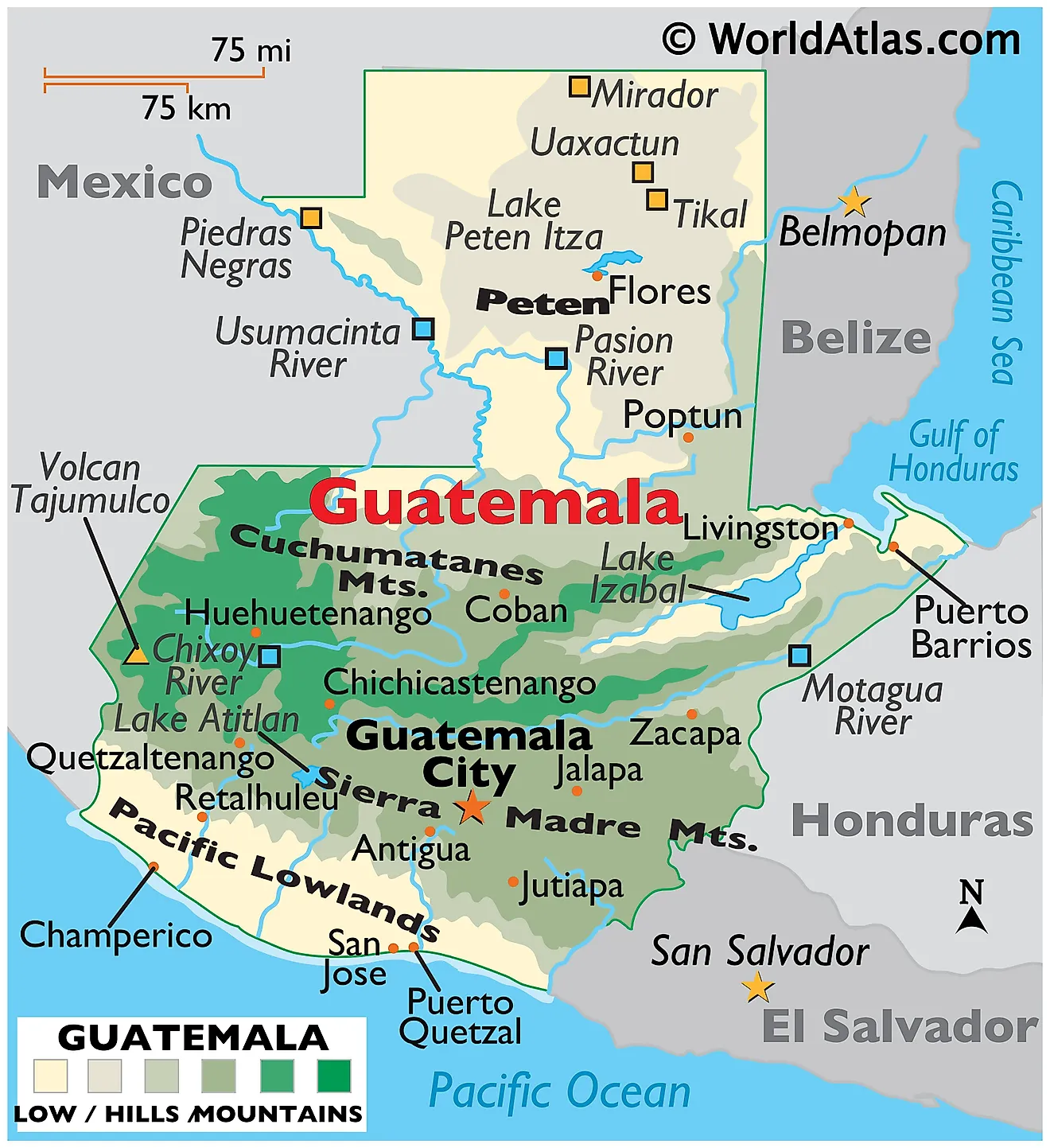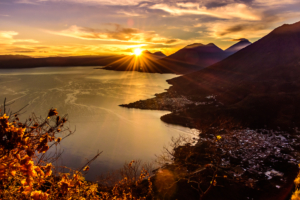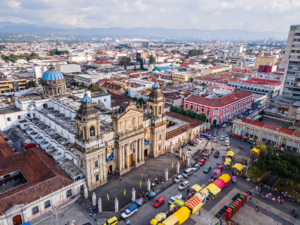About Guatemala
Guatemala, officially the Republic of Guatemala, is a country in Central America bordered by Mexico to the north and west, Belize and the Caribbean to the northeast, Honduras to the east, El Salvador to the southeast, and the Pacific Ocean to the south. Known for its rich Mayan heritage, diverse geography, and vibrant culture, Guatemala is often referred to as the “Land of Eternal Spring” due to its pleasant climate. The country’s capital and largest city is Guatemala City. Key attractions include the beautifully preserved colonial city of Antigua Guatemala, the vast archaeological site of Tikal National Park, the stunning volcanic Lake Atitlán, and the colorful Chichicastenango Market, renowned for its vibrant textiles and handicrafts.
Guatemala’s varied landscape includes volcanic mountains, lush rainforests, and scenic coastlines, offering a diverse array of natural beauty. It is home to numerous UNESCO World Heritage Sites.
Population
As of 2023, Guatemala has a population of approximately 17.6 million people, making it the most populous country in Central America. The population is ethnically diverse, with a mix of Indigenous peoples (primarily Maya), Mestizo (mixed Indigenous and European descent), and smaller communities of European, African, and Asian descent. Indigenous communities, who make up approximately 44% of the population, continue to preserve their cultural traditions, languages, and artisanal crafts. Despite their cultural contributions, many Indigenous groups face social and economic challenges, including limited access to education, healthcare, and political representation. Efforts are ongoing to address these disparities and promote the rights and well-being of Indigenous peoples.
The official language is Spanish, spoken by the majority of the population. However, there are 21 recognized Indigenous languages, primarily of Mayan origin, which are still widely spoken in rural areas.
Religion
Guatemala is predominantly a Christian country. The majority of the population identifies as Roman Catholic, although Protestantism has seen significant growth over the past century, with evangelical Protestant denominations now comprising a substantial portion of the population.
Indigenous spiritual practices also remain prevalent, often practiced alongside Christianity. These traditions are deeply rooted in Mayan cosmology, involving rituals, offerings, and sacred sites. Mayan spirituality often incorporates a profound connection with nature, cycles of the moon, and celestial events. Ceremonial practices, such as fire offerings and the use of sacred altars, are still observed in many Indigenous communities and hold great cultural significance. However, these practices have faced challenges, including historical suppression during colonization and ongoing social stigmatization. Today, there is a growing movement to preserve and respect these spiritual traditions, with efforts to integrate them into broader cultural and national recognition.
Map of Guatemala
Land Area: 107,159 km2
Water Area: 1,730 km2
Total Area: 108,889 km2
Source: https://www.worldatlas.com/maps/guatemala
Traveler Information
Immigration and Customs:
Visitors to Guatemala typically require a valid passport and, depending on their nationality, may need a visa. Citizens of many countries, including the United States, Canada, and most European nations, can enter Guatemala visa-free for stays of up to 90 days. Upon arrival, travelers should ensure their passport is stamped. Extensions for longer stays can be requested at the Migration Directorate.
Customs regulations allow visitors to bring in personal belongings, including cameras, laptops, and small amounts of alcohol and tobacco for personal use. Prohibited items include drugs, firearms, and certain agricultural products. It’s recommended to declare valuables upon entry to avoid complications.
Travel within the country:
The official currency is the Guatemalan Quetzal (GTQ), and travelers should carry some cash, especially in rural areas, as credit cards may not be widely accepted outside urban centers and tourist destinations.
Transportation options in Guatemala include buses, private shuttles, and domestic flights. Public buses, often called “chicken buses,” are a cost-effective but crowded and less safe option. Private shuttles are a preferred choice for tourists, offering greater comfort and security.
Domestic flights connect major cities, such as Guatemala City and Flores, providing convenient access to remote attractions like Tikal. Renting a car is possible but requires caution due to varying road conditions and driving practices. Taxis and ride-sharing services are available in urban areas.
Travel health:
Travelers to Guatemala should ensure their routine vaccinations are up to date, including measles, mumps, and rubella (MMR) and tetanus-diphtheria. Additional recommended vaccinations include hepatitis A, typhoid, and, in some cases, rabies. Malaria prophylaxis is advised for those visiting rural areas with high mosquito activity.
It’s essential to drink bottled or purified water and avoid consuming raw or undercooked foods to prevent gastrointestinal issues. Travelers should carry a basic medical kit and be aware of the location of hospitals or clinics in their travel area. Comprehensive travel insurance is strongly recommended to cover medical emergencies and evacuations.
Source: ChatGPT Collaboration. “Guatemala.” December 2024


